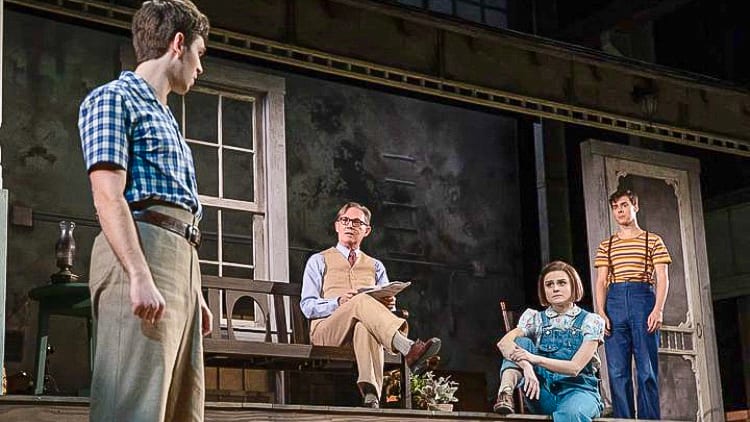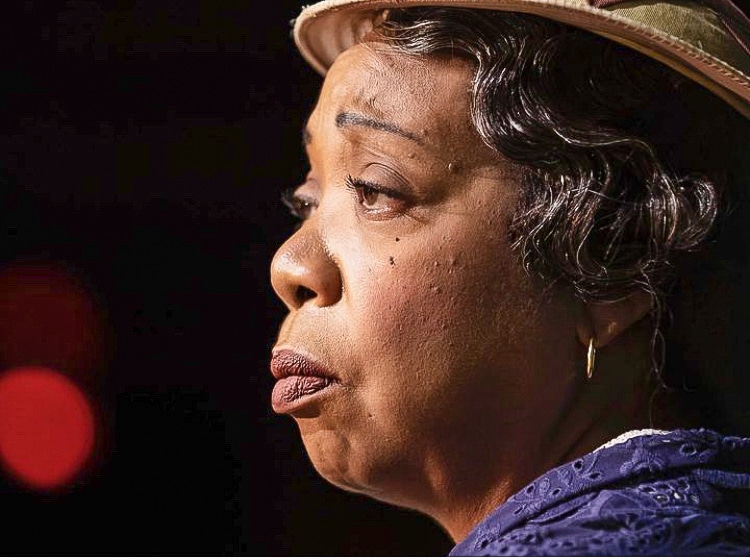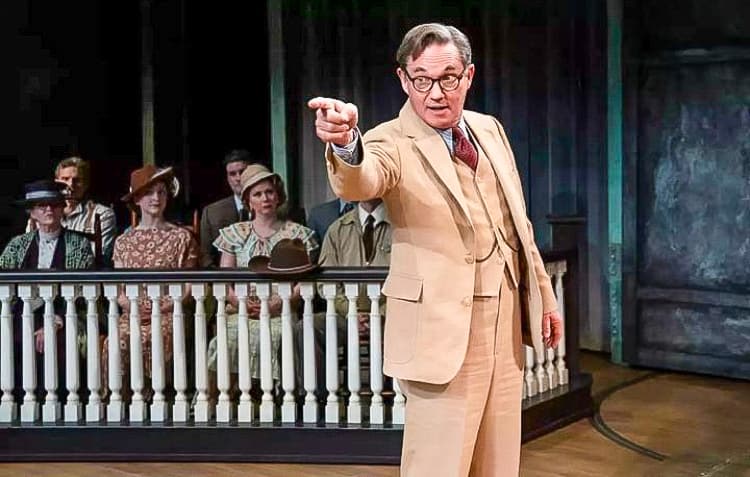Last Updated on October 11, 2023, 7:52 PM | Published: October 11, 2023
OKLAHOMA CITY — When Harper Lee’s seminal, racially charged novel “To Kill a Mockingbird” was first released in 1960, at the outset of the erupting Civil Rights Movement, it became a shockwave rumbling throughout America, shaking hearts and minds and forming a picture of what the country could be with hope and perseverance.
More than six decades later, the same story is now a sad reminder of how little progress has been made.
In its newest incarnation, Lee’s story of racism, family, miscarriages of justice, and misplacements of optimism is now a stage play penned by Oscar-winning (sometimes polarizing) writer Aaron Sorkin, with the 2023 touring production gracing the OKC Civic Center stage now through October 15th.
It would be difficult to call this new take on the classic a “re-imagining” or anything like a “deconstruction.” It’s the same powerful story, same iconic characters, and same battered idealism, but with a significantly reworked structure and an omnipresent nod toward the modern day.
And yet, when Sorkin’s stage adaptation was first taking shape in 2018, he was actually sued by Lee’s estate on the grounds that the new work was too much of a departure from the novel (and from the legendary 1962 film adaptation, of which Lee herself was a great fan.)

Their chief concern? That the character of hopeful hero, everyman ideal, and father-of-the-century Atticus Finch was too fundamentally different from Lee’s original conception.
He’s not.
Sorkin’s Atticus Finch is the exact same character with the exact same motivations and personality.
What’s changed is the audience, and our ability, or our willingness, to see his unflinching belief in the good of mankind as anything other than naive and short-sighted.
And it’s clear that Sorkin sees it, too.
Sorkin’s detractors love to point out his own seemingly naive idealism running throughout works like “The West Wing” and “The Newsroom,” and you can feel him wrestling with those inclinations throughout his script here, with the characters around Finch – primarily the Black characters – regularly calling out his short-sightedness.

In fact, one of the principal differences in Sorkin’s take on the story is the larger, more vocal, and more individually empowered roles of Calpurnia and Tom Robinson, “Mockingbird’s” two main Black characters.
Rather than the largely passive characterizations of the novel and film, they both spend their stage time here actively pushing back against Finch’s optimism and repeatedly attempting to make him understand that the “better world” that he believes is dawning is not one that they can see coming at all.
As audience members sitting here in 2023, just as Sorkin writing the new script in 2017, we know who ended up being right.
Finch’s belief in a positive outcome and willingness to defend the “friends and neighbors” of Maycomb, Alabama now smack more of the whataboutism and damaging centrism of the modern political divide much more than the heroically undying hope and resilience of Gregory Peck’s Oscar-winning portrayal in 1962.
All of which rests on the shoulders of leading man Richard Thomas.
Well-versed in the “simple country everyman” role from his childhood days as John-Boy in the wholesome family classic “The Waltons,” Thomas carries both an air of genuineness and a commendable Southern accent, but his strength in the role of Atticus Finch is surely his wearier realism.

Gregory Peck’s screen legend portrayal feels immovable and irreversibly resolved, a paragon of ground-level principles and fatherly protectiveness.
But Thomas’s Atticus Finch is trying. He’s trying so hard to do what he believes is right because he wants it to be right. He’s quietly exhausted, spread too thin between his work and his children, and feels almost like he’s barely hanging onto his own cooler head at times.
And of course that’s thanks in no small part to the precociousness and troublemaking of his children, Scout and Jem, and their new friend Dill.
In Sorkin’s “Mockingbird,” the children aren’t just the on-stage narrators, they’re the frame through which the audience sees and experiences the entire story. They move through and around each scene, recalling the events all after the fact, disagreeing over details and dropping revelations and foreshadowing throughout, often tripping over the story they’re telling in the way that children do.
At the press night performance, the role of Scout (arguably the play’s co-lead) was performed admirably and endearingly by Mariah Lee, standing in for touring regular Maeve Moynihan, with Justin Mark providing one of the night’s strongest performances as Jem.
That’s all based, of course, on what was audible during the press night presentation through the actors’ noticeably too-quiet mic audio and the concerning, sometimes ceaseless cacophony of coughing and cell phones.
These are issues rarely, if ever, experienced at Civic Center before, but readily pointed out by numerous audience members after the show.
(Acting side note: The role of nasty, old, racist neighbor Mrs. Dubose is portrayed on stage by the great Mary Badham, Oscar-nominated at just ten years old for her role as Scout in the 1962 film. Very cool.)

Ultimately, once you’re accustomed to the new, unbound structure and the children’s “unreliable narrator” framing (and once you accept that Sorkin’s snappy, quick-witted, self-aware dialogue may be a tad mismatched to the Alabama drawl,) you’ll be treated to a “Mockingbird” as powerful and devastating as ever.
But this time, no new Civil Rights heroes are to be born from the story, no new iconic characters or motivational ideals.
Instead, what we’re left with is the stark reminder that what was true in the story’s 1934 setting was still true when Lee wrote the novel in 1960, still true when Sorkin wrote this new adaptation in 2018, and still true as ever now in 2023.
Yes, the “all rise” through line is just a bit heady and just a bit heavy-handed, but as the characters themselves consider, in the face of the worst eternal tragedies, maybe sometimes just rising to the challenge is enough to meet it.
Sorkin’s thesis statement seems to come as Jem laments the hatred and racism still scarring the heart of America even though the Civil War “was seventy years ago.”
“No, it was yesterday,” Atticus tells him, coming as near to breaking as any other moment of the evening. “It’s always yesterday.”
“Harper Lee’s To Kill a Mockingbird” starring Richard Thomas is running now through October 15th at OKC’s Civic Center Music Hall, presented by OKC Broadway.
For showtimes, tickets, and more information, visit okcciviccenter.com.

Brett Fieldcamp has been covering arts, entertainment, news, housing, and culture in Oklahoma for nearly 15 years, writing for several local and state publications. He’s also a musician and songwriter and holds a certification as Specialist of Spirits from The Society of Wine Educators.











